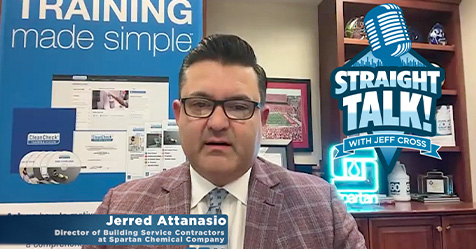Facilities management is a growing field with a variety of career choices, solid compensation, and a relative lack of competition. It’s also a growing topic in higher education right now. Whether undergraduates are choosing to pursue a degree in facilities management or facilities professionals are strengthening their knowledge with a professional certificate in the field, savvy students are using programs in higher education to seize the moment, maximize their facilities expertise, and score better-paying jobs.
According to a 2011 report by the International Facility Management Association (IFMA), more young people are working in facilities management than ever before. Nine percent of 2011 survey respondents were 34 or younger, up from 7 percent in 2007. However, while more young people are going into facilities management, there is still a need for more, says Jed Link, a spokesperson for IFMA.
The Need for Recruitment
A more recent IFMA report published in March 2017, “Raising the Bar: From Operational Excellence to Strategic Impact in FM,” makes the case for recruiting younger facilities management professionals to replace an aging workforce, citing “the need to move beyond a cost-centre mentality and build recognition for the value and [return on investment] that excellent, well-supported [facilities management] can bring.”
The role of facilities management in a business’s strategy has shifted dramatically during the past 30 years. Businesses now view the facilities from which they operate as a tool to achieve their goals, and building upkeep and maintenance have become much more important as part of this shift. This is because clean buildings promote a healthy, productive workforce or energy-saving strategies that in turn, can help businesses achieve corporate sustainability goals.
This shift has motivated those in the field of facilities management to find better ways to measure success, according to Link. “That’s why you’re seeing a lot more attention given to independent accrediting and [degree programs],” he says. “It’s no longer sufficient to have every approach. You now need to plug into that global community to make sure that what you’re doing is consistent across the globe.”
Opportunities for Advancement
The IFMA Foundation, an organization that was founded in large part to help advance the facilities management profession, accredits a total of 31 degree and certificate programs in facilities management around the world. These programs are evaluated by the IFMA Foundation for adherence to IFMA’s 11 core competencies of facilities management, which include the following:
- Building operations and maintenance
- Environmental stewardship and sustainability
- Project management
- Communication
- Emergency preparedness and business continuity
- Finance and business
- Human factors
- Leadership and strategy
- Quality
- Real estate and property management
- Technology.
Link is quick to point out the benefits of attending an accredited degree or certificate program in facilities management. “The graduation employment rate is 100 percent. Every single person [who] comes out of the programs accredited by IFMA finds a job. And a lot of them have multiple offers.”
Below is a sample list of institutions that have degree programs accredited by IFMA:
- Arizona State University
- Brigham Young University
- Community College of Philadelphia
- Cornell University
- Florida A&M University
- Georgia Institute of Technology
- Missouri State University
- Rochester Institute of Technology
- Temple University
- Texas A&M University.
Vast Industry Offerings
Facilities management isn’t necessarily on a high school student’s radar as he or she plans for the future. “It’s a career path many have not heard of before,” admits Steve Lockwood, IFMA director of accreditation and academic affairs. When Lockwood speaks to prospective facilities management students, he points to iconic buildings like Madison Square Garden in New York City to illustrate the importance of the profession and the need for each building to have educated managers dedicated to its protection.
He also notices that many traditional undergraduate students who pursue bachelor’s degrees in facilities management have an interest in architecture, engineering, design, real estate, or construction management first. Most undergraduate degree programs in facilities management will have a focus that coincides with one of these sister subjects, but that varies widely across programs.
For example, Cornell University in Ithaca, NY, offers an undergraduate degree with a focus on facilities management in its Design and Environmental Analysis School. According to Lockwood, Cornell’s program focuses on human factors, operations, and management and strategy. At Pratt Institute School of Architecture in Manhattan, which offers a Master of Science in facilities management, the focus is on operations maintenance, project management, technology, and real estate.
Other programs offer master’s degrees in facilities management, like the one at the School of Building Construction at Georgia Tech in Atlanta, GA. According to Eunhwa Yang, assistant professor for the program, “We have a balance between professional and academic focuses so that students can learn practical knowledge as well as develop problem-solving skills and critical thinking.” Some of the examples of the program’s advanced coursework include developing workplace strategies for workers’ health and employee retention, environmental issues in the workplace, building information modeling and its use in the facilities management field, computer aided facility management, and strategic facility planning.
Certificate Programs for Professionals
Many of those who land in a career in facilities management don’t have an undergraduate degree in the field (and some have not completed an undergraduate degree at all). That’s why some universities—such as UC Berkeley Extension in California— offer certificate programs to students with and without bachelor’s degrees. According to David Brotherton, program director, business and environment at UC Berkeley Extension, students who enroll there have an average of 10 years in industry experience before they start. The majority of the students have an employer reimburse some or all of their fees. Like most of the programs at Berkeley Extension, classes in facilities management are taught by experienced industry professionals and are more practical and collaborative in nature.
A Wide-Ranging Field
Facilities management is a “broad and encompassing field,” Brotherton says. For example, a facilities manager at a university will have very different challenges than one working in a pharmaceutical lab. Because of the large variety of skills and knowledge needed to advance in the field, it becomes difficult to coalesce formally within an educational track. Berkeley Extension and other successful programs have dealt with this challenge by finding experts with varied experience to teach courses in many distinct sectors. These programs also structure their courses in a collaborative way where students learn from each other. Additionally, certificate programs will personalize coursework to meet the needs and experience of students enrolled in the program.
Other certificate programs, like the School Facilities Management certificate program at Hofstra University in Hempstead, NY, focus on one specific sector within facilities management. This small program is dedicated to advancing the profession of facilities managers within school districts in the state of New York. Courses include building cleaning and maintenance, energy management, green cleaning, public speaking, business management, and organizational structure of the school district. The advantage of a program like this is that coursework can be very specific and tailored to the challenges of facility managers within one sector. Even though these students come from public school systems, approximately 70 percent of them do receive some form of tuition reimbursement, according to Pat Pizzo, assistant superintendent for business and finance at East Meadow School District in New York and an instructor at Hofstra’s certificate program.
Many of the students in the program at Hofstra do not have undergraduate degrees or experience as a student in a college classroom setting, so the program is structured to be collaborative. “I say: ‘At the end of this class you’re going to find out you’ll learn as much from the person next to you as you do from me, and my intent is to learn from you,’” Pizzo says. “‘If there’s something important to you, let’s add it to the agenda.’”
Incorporating Cleaning
Whether a program focuses specifically on custodial management or offers a more general track, cleaning should be a key element of any educational program focusing on facilities management. “Cleaning is a major component of facility management and these programs,” Lockwood says. “We want to make sure that all people understand that making the building clean, safe, and healthy is important.”




